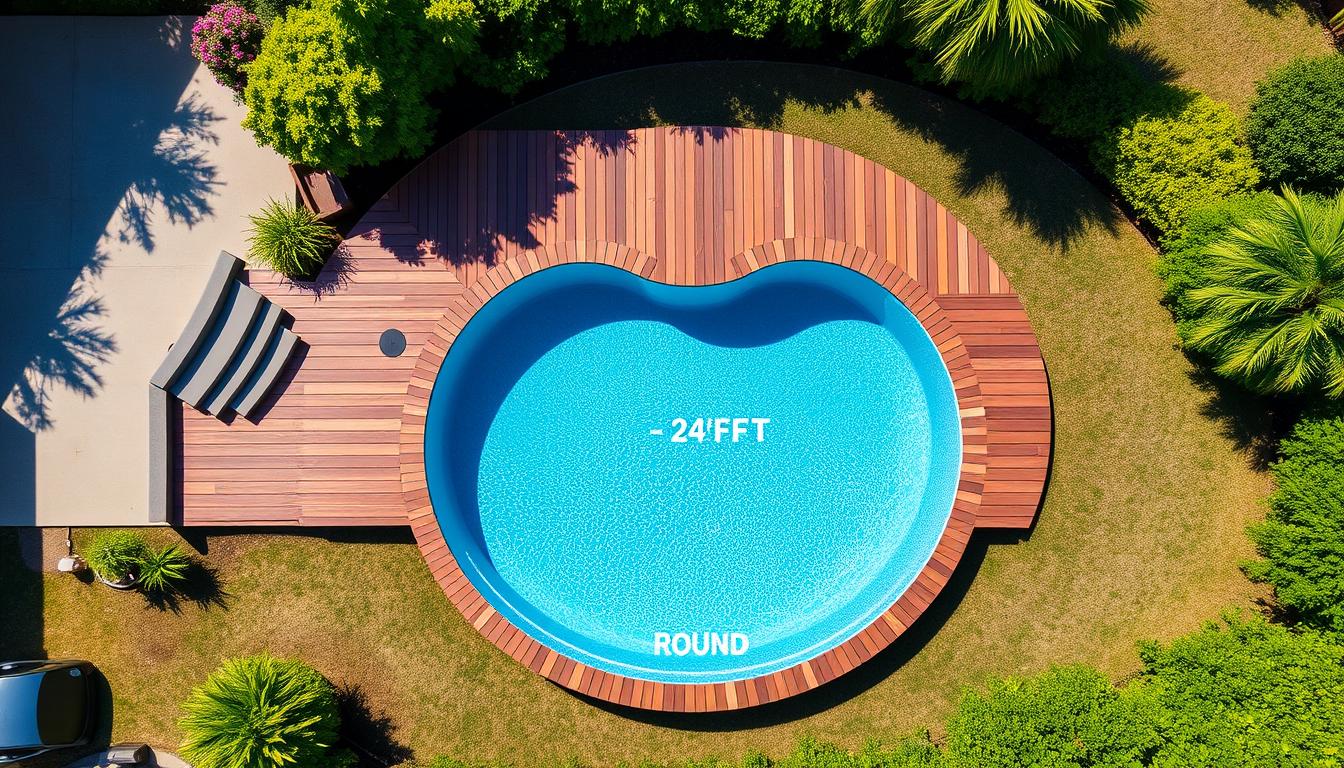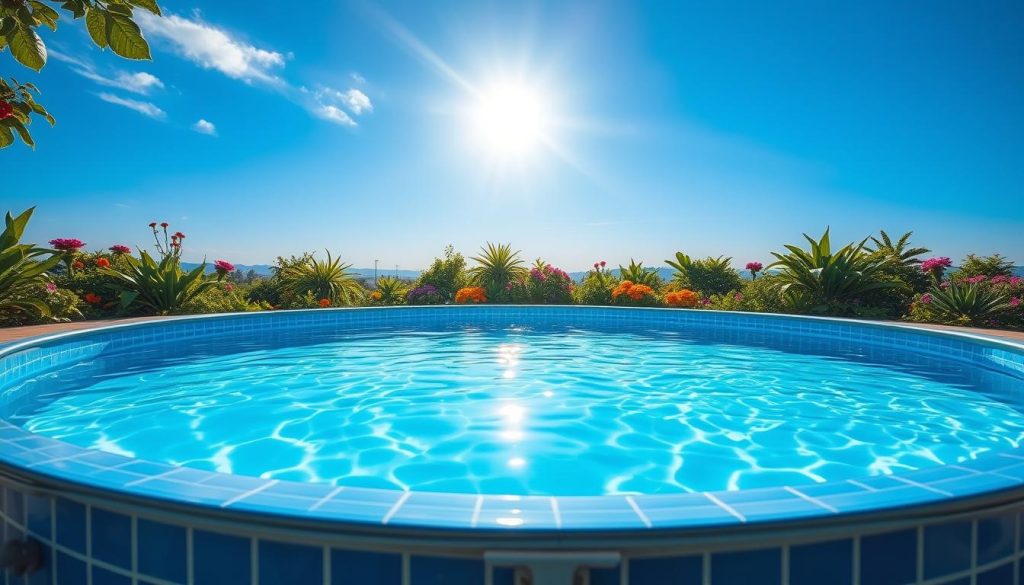
Knowing your pool’s water volume is crucial for proper maintenance. It’s essential for filling and upkeep of your pool. Let’s explore the water capacity of a 24-foot round pool, a popular choice for homeowners.
A 24-foot round pool offers plenty of space for swimming and fun. It’s perfect for backyard relaxation and entertainment. But how much water does it actually hold?
With a standard 52″ wall height, this pool contains about 14,652 gallons. If the wall is 54″ tall, it holds approximately 15,227 gallons. That’s a lot of water!
These numbers are important for pool owners to understand. They affect chemical balance, heating, and filtration efficiency. Knowing your pool’s volume is key to effective maintenance.
Understanding Pool Sizes and Water Capacity
Above-ground pools come in various sizes and shapes. Knowing pool size and water capacity is key for proper maintenance. This knowledge ensures safe and fun swimming experiences.
Common Above-Ground Pool Sizes and Gallons
Above-ground pools fit different yard sizes and swimming needs. Round pools are popular, with diameters from 10 to 24 feet. Oval pools suit narrower spaces, with sizes like 11’x30′ or 15’x30′.
Water capacity varies by size and wall height. Here are some examples:
- A 24′ round pool with a 52″ wall height holds approximately 13,600 gallons of water.
- An 11’x30′ oval pool with a 52″ wall height can hold around 7,800 gallons.
- A 15’x30′ oval pool with a 54″ wall height can accommodate about 8,400 gallons.
| Pool Size | Shape | Wall Height | Water Capacity (Gallons) |
|---|---|---|---|
| 24′ | Round | 52″ | 13,600 |
| 11’x30′ | Oval | 52″ | 7,800 |
| 15’x30′ | Oval | 54″ | 8,400 |
Factors Affecting Water Volume in Pools
Shape, depth, and wall height influence a pool’s water volume. Round, oval, or rectangular shapes affect capacity differently. Deeper pools hold more water than shallower ones.
Higher walls allow for more water in the pool. Water loss occurs through evaporation, splashing, and backwashing. Regular monitoring helps maintain optimal water levels for safety and performance.
Knowing your pool’s water capacity is essential for proper maintenance, chemical balance, and water conservation.
Understanding pool size, shape, and water volume helps you choose the right above-ground pool. This knowledge ensures it fits your space and meets your swimming needs.
How Much Water is in a 24 Foot Round Pool?
Knowing your pool’s water volume is vital for proper maintenance. Let’s explore the water capacity of a 24-foot round pool, a popular size among owners.

Calculating Water Volume for a 24 Foot Round Pool
We use a simple formula to find the water volume: Volume = π x radius² x depth x 7.48. For a 24-foot pool, the radius is 12 feet.
The depth depends on the wall height, usually 52 or 54 inches. Let’s calculate the volume for these heights:
| Wall Height | Water Volume (Gallons) | Water Volume (Cubic Feet) |
|---|---|---|
| 52 inches | 14,652 | 1,958 |
| 54 inches | 15,227 | 2,035 |
A 24-foot round pool with a 54-inch wall holds about 15,227 gallons of water. This equals roughly 2,035 cubic feet.
Water Requirements for Different Wall Heights
Wall height greatly affects water capacity. A 52-inch wall holds 14,652 gallons, while a 54-inch wall holds 15,227 gallons.
Knowing your pool’s exact volume is crucial for several reasons:
- Maintaining proper chemical balance
- Ensuring the efficiency of pool equipment
- Calculating the cost of filling or refilling the pool
- Determining the appropriate size of pool covers and other accessories
Accurately calculating your pool’s water volume is the first step in ensuring proper pool maintenance and a safe, enjoyable swimming experience.
Understanding pool size, wall height, and water capacity helps you make smart decisions. This knowledge ensures a clean, healthy swimming environment for everyone.
Importance of Knowing Your Pool’s Water Volume
Knowing your pool’s water volume is vital for proper maintenance. It helps you add the right amount of chemicals for safe swimming. You can keep chlorine levels between 1 and 3 ppm and pH between 7.2 and 7.6.
This knowledge also improves heating and filtration efficiency. A 24-foot round pool holds about 28,260 liters of water. You can use this to set the right flow rate for your filtration system.
For example, a 40,000-liter pool needs a flow rate over 167 liters per minute. This ensures a 4-hour turnover. Using the right pump size can save energy and maintain good filtration.
Accurate volume helps with regular pool care tasks. You can use the right amount of chemicals for shock treatments and algae control. It also helps schedule debris removal and vacuuming.
Knowing your pool’s volume helps keep water clear and hygienic. It extends the life of your pool equipment. You can also spot leaks and track evaporation more easily.
In short, understanding your pool’s water volume is key to good pool ownership. It helps with chemical treatments, heating, and filtration. This knowledge ensures a safe, clean pool for everyone to enjoy.







